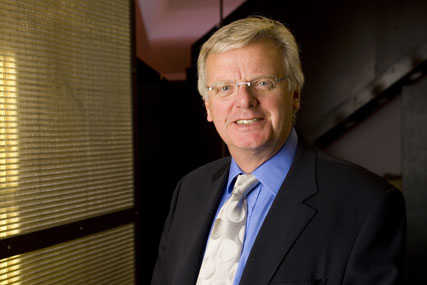
Speaking at the opening of a two-day conference hosted by IEA and Marketforce today, the ITV boss and one-time chairman of the BBC governors, gave credit to Lord Carter's White Paper for recognising "what needs to happen to take Britain from the analogue to the digital age - spanning content, networks, digital literacy and piracy."
He supported controversial suggestions made by both Ofcom and the Government for some form of funding, "either directly or indirectly" from investment through the television licence fee, as a solution to secure regional news plurality.
"If Parliament does want an alternative to BBC News in the nations and regions in the UK, then the Ofcom solution endorsed by the Government is probably the most sensible and practical approach," he said.
His comments will increase the pressure on BBC director general Mark Thompson, who has publicly stated there are "no circumstances" in which top-slicing proposals would be a good idea, claiming they were being driven by "ideologically focused" individuals, determined to "drive a wedge" into the principle of BBC licence fee funding.
Grade added that ITV stood ready to offer its airtime to carry any new, publicly funded regional news services, but dismissed the BBC's alternative suggestion of partnership instead of top-slicing, as "disingenuous".
He admitted the concept of a regional BBC/ITV coalition started as a really promising idea, but said it had "unfortunately evaporated on close examination and after months of intense negotiation".
"Out of £120m of value promised by Mark Thomson, approximately £20m was talked about for regional news," he said. "In the event, this translated to a potential £7m, and that not fully available until 2016," said Grade.
"By this time, regional news on ITV would have been long gone, and we would have had to move the regional news out of peak or pre-recorded it to have access to the £7m".
While not wanting to outright turn down the prospect of £7m in the current climate, Grade said it was "not the solution" and again stressed: "ITV is unable to go on paying for nations and regional news".
In recognition of next year's General Election, Grade also credited Shadow Culture Secretary Jeremy Hunt for having "some interesting ideas about local and even city-focused TV news," suggesting perhaps it was an idea whose time had at last come.
"I know Jeremy understands the market alone will not guarantee the plurality that most people seem to want," he said.
Elsewhere, the ITV chairman was bullish about how ITV had positioned itself for the future, saying the framework laid out in Digital Britain meant it would no longer be "fighting with one hand tied behind its back".
ITV was said to create fame, for its programmes, for its stars and equally for its advertisers' products, services and brands: "We are the big shop window and, in a fragmenting world, that is increasingly, not less, valuable," Grade said.
Tough decisions in the last year were said to have resulted in a more streamlined business model that had left the broadcaster ready to "take full advantage of the opportunities ahead offered by digital convergence".
Among these was viewing on-demand, said to be the "consumer success of the past 12 months", which Grade predicted would grow to about 12 to 15% of all viewing over the next three to four years.
"We at ITV believe in the power and the value of content. In our particular case, that power derives from British-made programmes," he said.
"Never in my 35 years in the business, has British content been in greater demand, either nationally or internationally, nor have there ever been more opportunities to monetise that content."
ITV's family of channels were said to be holding their share of the advertising market "for the first time in 25 years", and online ITV.com's figures for last month were five times higher than the year before.
Grade conceded the current advertising recession was making it "temporarily tougher" to monetise this success, but underlined his belief that with "audiences seeking out ITV's programming in ever increasing numbers", both on TV and online, "it is only a matter of time before the profits follow".




_1.jpg)
.jpg)
